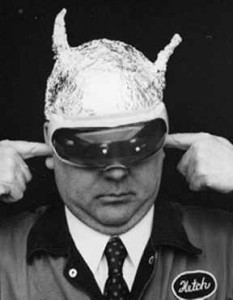For several years, I have run a site called I Read Odd Books. As the name implies, I write reviews or discussions of strange literature. In addition to strange fiction, I discuss books about conspiracy theory, the paranormal and alternate versions of history. I sometimes discuss books by authors who have large bodies of work outside of the book they wrote and it is hard to keep people on topic to the book and not the numerous websites or related books on the topic. After a while I wondered if it was even fair to insist that people remain on point with the book and not discuss all the information available. It felt distinctly censorious to insist people limit themselves to the book and wondered if I should create a separate site to discuss such books so that people would be able to discuss the entirety of the topic.
I love conspiracy theory. I love reading and hearing the theories people come up with and the ways they reach their conclusions. I love the sheer strangeness of it all.
But my love of odd topics is salted with many grains of skepticism. I am an atheist who received a darn good college education wherein I was taught to read and think carefully. I was taught how to find facts, how to verify sources and how to separate wheat from chaff. Years spent in high school debate also gifted me with the ability to put forth a case without using formal or informal logical fallacies (though sometimes in cross examination debate, being rational was decidedly optional). There are many reasons why people believe in conspiracy theory and the paranormal but those reasons aside, their refusal to follow the most basic rules of argument when offering their cases is upsetting and tiring. Encountering the same sort of poor reasoning, refusals to hear evidence that may disprove their ideas, and an inability to synthesize information from reading sources began to fill me with something close to dread.
I gave creating this site more consideration after the Newtown shooting. I am unsure what was at play in the creation of the LIBOR/Newtown and Aurora shooters conspiracy theory, but it was vile. It was stupid. And what is worse, it was easily proven false with five minutes of research. So I wrote a quick entry on IROB asking for people to think twice before believing the theory, that there had been no Senate Finance Committee hearings on the matter, nor were any in the pipeline, and that at no point had anyone flinging the theory showed a link between the fathers of the shooters or their employers and the LIBOR scandal.
The comments I received were upsetting. With seemingly no self-awareness, people posted information they insisted proved a link between GE and the LIBOR hearings/scandal or between the Lanza and Holmes families and the LIBOR hearings and scandals, and in so doing engaged in some common debate behaviors that I, an amateur skeptic, have found to be part and parcel with those who support conspiracy theory.
 False Equivalence
False Equivalence
–Someone left a comment insisting that GE’s involvement in bad loans in Australia and subsequent cessation of issuing of said mortgage loans was synonymous with involvement in the LIBOR scandal. The implication was that any bad acts on GE’s part meant they just had to be a part of the LIBOR scandal in some respect but issuing subprime loans is in no way similar to illegally manipulating interest rates.
Ad hominem
–That same commenter insinuated that I only wrote my opinion in order to raise the hits on my site. That was an interesting accusation to make since at the time I had no ads on I Read Odd Books and therefore benefited in no way from site hits. Impugning the motives of the person asking for proof is such a common tactic that ad hominem is often invoked even when it makes no sense.
Statements of fact with no evidence to back them up
–Someone commented that GE was most certainly a LIBOR defendant but offered nothing to prove that assertion. When I pointed this out, he never offered any proof.
Red herring (actually, this comment covers a lot of illogical ground, including false equivalence)
–That same commenter insisted that there had been Senate Finance Committee hearings on the LIBOR scandal because HSBC had been fined over a billion dollars for their role in the LIBOR scandal. Actually, it was a Department of Justice probe and HSBC receiving a fine had nothing to do at all with GE or FICO or any of their employees testifying before a Senate Finance Committee hearing.
Failure to understand sources
–A commenter named Trevor posted a link to an article that he said showed the links between GE and the LIBOR scandal. The article was a break down of recent financial scandals, including LIBOR, but GE was not in any manner mentioned in the section on LIBOR. GE was mentioned for rigging municipal bond deals, which had nothing to with LIBOR. But for many, GE being mentioned in an article where LIBOR was mentioned as well was proof positive that there was a connection between the two.
Deliberately misleading
–A commenter named Jenna sneered that I needed to tell Bernanke and Geithner that they had not, in fact, given testimony about LIBOR. Bernanke was asked about LIBOR as he gave the Federal Reserve’s semi-annual monetary policy report before the Senate Banking Committee. Geithner appeared before a Senate panel to discuss LIBOR. Neither were ever witnesses before a Senate Finance Committee hearing and the presence of either at any sort of Senate panel or hearing in no way proves a connection between Mr Lanza or Mr Holmes and their employers with the LIBOR scandal.
Onus probandi, argumentum ad ignoratiam
–A reasonably intelligent comment from Emma caused me existential despair when I reached the end, for she said that just because we don’t know that a witness list that includes Mr. Lanza and Mr. Holmes is out there does not mean it does not exist to prove her case. In short, she engaged in onus probandi, which means that the person who is making a claim is pushing the burden of proof onto the person arguing the claim, saying that the claim must be proven untrue, not that it must be proven true. Since there was no way to dismiss a list not offered into evidence, there was no way I could refute it, if I followed her illogical conclusion. She also engaged in argumentum ad ignoratiam wherein she pushes aside any notion that we must withhold judgment until there is actual proof to reach a conclusion.
Inability to stay on topic
–Almost all of the comments veered completely off topic, seemingly without realizing it. In a conversation about whether or not Mr. Holmes and Mr. Lanza or the companies they worked for were on a witness list to testify before the Senate Finance Committee about the LIBOR scandal and that their sons were turned into Manchurian candidates in order to scare them off, we ended up discussing all sorts of things that had nothing to do with the topic. Senate Banking Committee hearings, fines given to other companies, testimony given by people not Mr. Holmes or Mr. Lanza, testimony from companies not FICO or GE. This is what I call the greater spitwad argument, wherein people will toss out anything they think is relevant in the hopes that one of the wads sticks.
One entry about one conspiracy theory and it was like a role call of bad thought and logical fallacies. It may seem pedantic to some, but there are basic rules of engagement one should follow when making an extraordinary claim. The logical fallacies and bad arguments I invoked above are not obscure, finicky ways of dismissing claims. They are at the heart of the poor reasoning and deduction that go into making conspiracy theory and supernatural claims and they were offered without a second thought as to how they destroyed the validity of the argument those people wanted to make.
But even that wasn’t enough to make me nag my husband to create this site for me. I was pushed over the edge last Monday, when two bombs went off during the Boston marathon.
Within an hour of the bombings, online people were already speculating wildly, without an ounce of evidence, that the Tea Party was responsible.  Then Alex Jones invoked false flag and we were off to the conspiratorial races. Before long the mainstream press was dragging the names of innocent people through the mud, making accusations against them based on chatter heard on police radio. In fact, as the mainstream media descended into the sort of sewer reporting common to Infowars, or perhaps following the lead of Infowars, a missing student from Brown University was accused of being Suspect #2, even though he bears only a ballpark resemblance to the suspect (hair length, mole position, and basic facial bone structure made it clear the missing student was not Suspect #2), his face was published on the front of the New York Post, may they be sued until only lint is left in their pockets. The subsequent furor caused the missing student’s family no small amount of pain and forced them to remove social media sites they used to get the word out about their missing loved one.
Then Alex Jones invoked false flag and we were off to the conspiratorial races. Before long the mainstream press was dragging the names of innocent people through the mud, making accusations against them based on chatter heard on police radio. In fact, as the mainstream media descended into the sort of sewer reporting common to Infowars, or perhaps following the lead of Infowars, a missing student from Brown University was accused of being Suspect #2, even though he bears only a ballpark resemblance to the suspect (hair length, mole position, and basic facial bone structure made it clear the missing student was not Suspect #2), his face was published on the front of the New York Post, may they be sued until only lint is left in their pockets. The subsequent furor caused the missing student’s family no small amount of pain and forced them to remove social media sites they used to get the word out about their missing loved one.
Another young man who wasn’t even in Boston during the bombing was dragged into this, a young man I will call Mike. Mike was identified by several sources as being Suspect #1, who was killed early Friday morning. There were several people online with that name, but for some reason some people found a twitter feed of a 15-year-old Ethiopian national living in the UK, and insisted he was the bomber. This accusation appeared in many places online, even as saner voices begged for the name to be removed, that it was manifestly impossible that an Ethiopian teenager residing in Europe could be the bombing suspect. I was on my cellphone, reading as this happened, and lack screen shots but I will be revisiting this later in my first real entry here because this is at the heart of conspiracy theory – an inability to change one’s mind even as mountains of evidence are presented that disprove a theory. As of late Friday, Alex Jones’ Infowars was still claiming that Suspect #2 was the missing Brown student.
The International Business Times went one step further – even after they named two wrong suspects, they hilariously chided social media outlets like Reddit for trying to solve the case and for putting misinformation out there, as if people poring over pictures in cyberspace forced them to publish any name that came along and accuse them of the Boston Marathon bombings. IBT published the two names online around 3:30 a.m. CST on Friday. The names were still up there when I finally fell asleep around 6:00 a.m. So yeah, sure, Reddit was clearly the problem here.
How did this happen? How did the mutterings of average Joes, of regular citizens yammering online, become the basis for mainstream reporting? People who believe fringe ideas often state that they cannot trust the media but these days, if the handling of the Boston bombing reporting is anything to go on, conspiracy theorists could be right. We all watched as the worst sort of reasoning and lack of dedication to proven fact infested media reporting of one of the worst acts of domestic terrorism on American soil in almost 20 years. Did heads roll? Were people fired? Or has this laxity and lack of perspicacity just become so common that it seems unavoidable? Errors happen. People get things wrong from time to time. But this was not a simple mistake. This was media outlets publishing as fact the first rumors to come across their laptop screens.
So I got angry and unhappy and finally launched the site I had been talking about for months.
Will I change anything? Probably not. Conspiracy theory and the supernatural are remarkably impervious to fact, or even the aforementioned mountains of evidence. But at some point, even being just another voice in the e-wilderness, asking for reason, attention to evidence, and logical debate, has its appeal. I get to channel the energy I spend yelling at headlines and Twitter feeds into this site. So that’s a net win for me, at least.
On this site, all voices are welcome as long as they follow my comment policy. I will never degrade anyone who believes in that which cannot be proven with logic and legitimate evidence. I will never mock anyone or permit anyone to be mocked here. In fact, I may not even respond much to comments left by True Believers unless their comments demand it, either by request of the commenter or by the information they bring to the table. For example, there is no way to argue with those who believe that the planes that flew into the Twin Towers on 9-11 were holograms and that no one died that day. They believe that everyone involved that day was an actor, sometimes “identifying” one actor in several different roles. They have pictures of clearly different people whom they claim are one person, they insist the Towers never came crashing to the ground, and there is nothing anyone can say to influence them. They believe 9-11 didn’t happen, in the face of overwhelming evidence, because they reject anything that does not prove their case (one of the most extreme forms of confirmation bias I have personally witnessed). There is no way they will change their minds and it is folly to try to engage them. One of the things that keeps a person sane online is knowing how to pick one’s battles.
 But even knowing that, I think it is important to do this. I think it is important to always be on the side of informed truth. This site will likely focus heavily on books, but I will be discussing media, conspiracy and paranormal sites and current events as well. So welcome to Houdini’s Revenge. All are welcome, all will be heard, and all will be dissected.
But even knowing that, I think it is important to do this. I think it is important to always be on the side of informed truth. This site will likely focus heavily on books, but I will be discussing media, conspiracy and paranormal sites and current events as well. So welcome to Houdini’s Revenge. All are welcome, all will be heard, and all will be dissected.